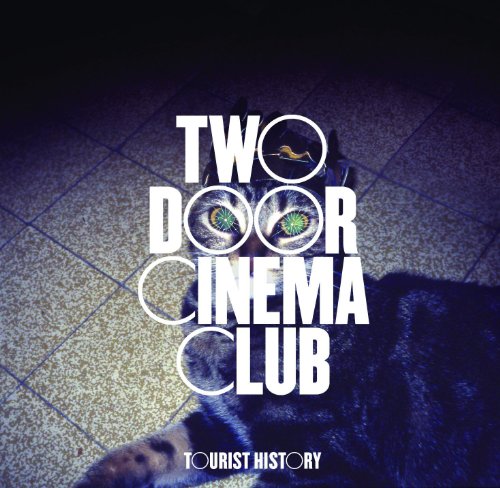
Two Door Cinema Club
Tourist History
Release Date: Apr 27, 2010
Genre(s): Rock, Pop, Electronic
Record label: Glass Note
Music Critic Score
How the Music Critic Score works
Album Review: Tourist History by Two Door Cinema Club
Very Good, Based on 6 Critics
Based on rating 4/5
On their debut LP, this fresh-faced trio from Northern Ireland deliver straight-up, catchy-as-hell indie pop that sounds like Tokyo Police Club meets Franz Ferdinand. True, these lads aren't reinventing the wheel, but what they forfeit in originality they make up for in perfect execution of cute dance-rock anthems. [rssbreak] Produced by Eliot James (Bloc Party) and mixed by Parisian studio wiz Philippe Zdar (Cassius, Phoenix), the album's 10 tunes sound massive, slick and ready for the dance floor without sacrificing the appealing sincerity in Alex Trimble's vocals.
Based on rating 7/10
One would imagine the bedrooms of messrs Alex Trimble, Sam Halliday and Kevin Baird to be packed to the brim with musical memorabilia from the past decade. Dishevelled copies of NME and Q fight for floor space with well worn and slightly overplayed early editions of Silent Alarm and News & Tributes among others. Indeed, were Black Books set in three grotty bedsits in the Northern Irish seaside resort of Bangor it may pan out something like this.
Based on rating 3.5/5
Up until about six months ago, the world at large could be forgiven for thinking that the only bands Northern Ireland ever churns out are of the “punk” and “rock” variety (we’re forgetting about [a]Snow Patrol[/a] on purpose). Bangor’s [a]Two Door Cinema Club[/a] are apparently hell-bent on proving otherwise, peddling the kind of awkward electropop that could score a million broken-hearted teenage romances given half the chance. Already bigged up by the likes of [a]Kanye West[/a], their debut album is a short, sharp shock to the system.
Based on rating 7/10
Though Two Door Cinema Club's music is resolutely indie at heart, the band released its early singles on the hip, largely electronic imprint Kitsuné. After listening to Tourist History, what the label heard in them becomes clear: Two Door Cinema Club craft immaculate pop that is infectious almost to a fault. On songs like their calling card “Something Good Can Work,” nimble guitars and drums -- both live and programmed -- propel yearning verses and big, hopeful choruses perfect for shouting along to.
Based on rating 6/10
Two Door Cinema Club make sun-drenched, guitar-led indie pop bearing song titles that, as the BBC observed, sound as if they were swiped from a badly-written self-help book. From this, one is tempted to conclude that the group’s time under the gimlet glare of expectant indie music lovers may span little more than the average length of their songs: about two and a half minutes. But before we slap this Northern Irish trio with that most virulent of terms, “landfill indie”, it should be noted that Two Door Cinema Club at least lack the risible seriousness of Keane and precarious self-importance of the Temper Trap (song titles notwithstanding), and therefore warrant some earnest attention.
Opinion: Fairly Good
Flashes of greatness place TDCC among the UK’s better breaking-through bands. Lou Thomas 2010 Bangor trio Two Door Cinema Club have a penchant for naming their songs with what sound like chapter titles from an awful self-help book. The Northern Irish boys are apparently less crooked than an avaricious motivational guru yet are happy to pepper their debut with tunes called Do You Want It All, This Is the Life and Something Good Can Work.

